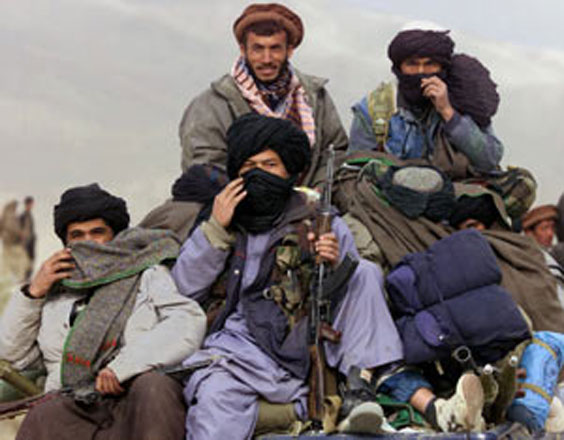Some senior Taliban figures are ready to negotiate a ceasefire and might be ready to accept a long-term US military presence in Afghanistan as part of a comprehensive peace deal, according to a report to be published on Monday based on interviews with Taliban officials and negotiators, the Guardian reported.
The report, published by the Royal United Services Institute, finds that the Taliban is determined to make a decisive break with al-Qaeda as part of a settlement and is open to negotiation about education for girls, but is adamantly opposed to the constitution which it sees as a prop for President Hamid Karzai's government.
The Taliban insurgents will not negotiate with the Karzai government largely because of its record of corruption. They do not trust Kabul to run fair elections, which suggests that, even if the moderates interviewed in the study prevailed within Taliban circles, serious obstacles to a peace deal would remain.
The institute's report, entitled Taliban Perspectives on Reconciliation, is the product of interviews with four unnamed figures, two of whom were ministers in the former Taliban government and are still close to the inner circle of leadership. One is described as being "closely associated" with Mullah Mohammad Omar, the Taliban leader.
A third is portrayed as "a senior former mujahideen commander and lead negotiator for the Taliban", although not part of the movement itself, and the fourth is said to be "an Afghan mediator with extensive experience negotiating with the Taliban".
The report concludes: "The Taliban would be open to negotiating a ceasefire as part of a general settlement, and also as a bridge between confidence-building measures and the core issue of the distribution of political power in Afghanistan.
"A ceasefire would require strong Islamic justification, obscuring any hint of surrender," it adds.
Even more surprising, in view of the official Taliban propaganda portraying it as leading a struggle against foreign invaders, the report says the insurgents are "prepared to accept a long-term US military presence in Afghanistan".
According to one interviewee, described as a founder member of the Taliban, a settlement that left US troops operating out of five primary military bases - Kandahar, Herat, Jalalabad, Mazar-e-Sharif and Kabul - might be acceptable as long as the US presence "does not impinge on our independence and religion".
In other words, the Taliban might accept continuing US counter-terrorist operations targeting their former ally, al-Qaida, as long as the bases were not used as a launching pad for attacks on other countries or for interference in Afghan politics.
The report even suggests that the Taliban would co-operate in tracking down al-Qaida members, noting that the leadership and base "deeply regret" their past association with the global jihadist group.
Michael Semple, one of the report's co-authors and a former EU envoy to Afghanistan, said that interviewees represented a significant but not yet dominant strand in Taliban views. "We are not saying that this is some kind of poll that says three out of four Taliban members are in favour of a ceasefire," he said.
"But there is a part of the movement who see there is no prospect of a military victory and so ceasefire would make sense. This is not the official line, but rather the outer fringe of Taliban thought. It's not mainstream yet."
Semple, now at Harvard University, interviewed another Taliban commander in July, who also admitted there was no prospect of an insurgent victory, but he said that commander was not part of the institute's study.
Contacts between US officials and Taliban representatives have stalled largely because of failure to conclude a confidence-building deal to exchange five Taliban prisoners held at Guantanamo Bay for a US soldier captured by insurgents. Substantive talks, which were due to be held in Qatar, are expected to remain on hold until after the US presidential election in November, but senior US officials said they were holding discussions this week with Pakistan, where the Taliban leadership is based, about the safe passage of insurgent officials for future peace talks.
"Reconciliation remains a key component of our strategy," a senior US official said. "The safe passage working group was meeting this week alone as a piece of that, and Ambassador [Marc] Grossman [the US special envoy for Afghanistan and Pakistan] will embark on an upcoming trip at some point to continue to pursue this in a very robust manner...."
Another senior official stressed that the official US designation on Friday of the Haqqani network, a Taliban faction based in the Pakistani tribal area of Waziristan, would not rule out future talks with the group, and would not lead to the financial sanctions against Pakistan. The official disowned allegations made last year by Admiral Mike Mullen, the outgoing chairman of the joint chiefs of staff, who described the Haqqani network as "a veritable arm" of Pakistani intelligence.
"I want to just unequivocally state that this in no way is the consensus, unanimous view of this administration; that we are making absolutely no effort to begin a process to designate Pakistan as a state sponsor of terrorism," the US official said.
Semple said he did not think the designation of the Haqqanis would have any serious impact on future peace talks.
"The US have already given them a good few chances to to do politics," he said. "They are really at the heart of the nastiest part of the armed struggle."
Edited by: S. Isayev






